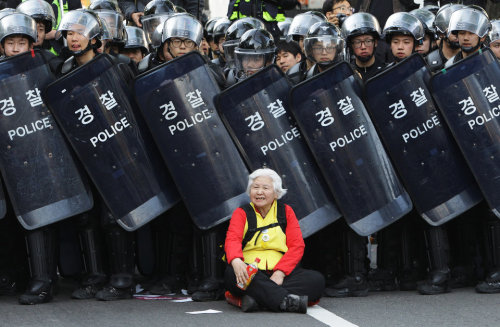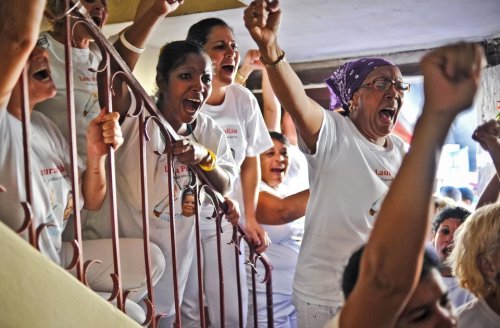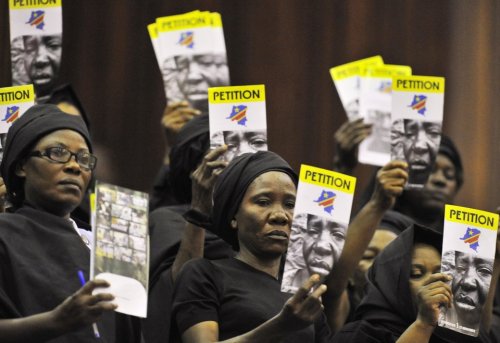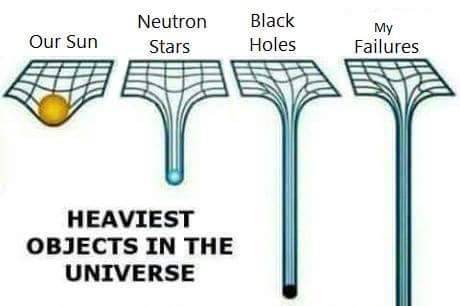Emmanuel Macron Beats Marine Le Pen And All Of 2017 Isn't A Complete Trash Fire.
Emmanuel Macron beats Marine Le Pen and all of 2017 isn't a complete trash fire.

Thank you, France. I'ma go eat a croissant.
(Results via The Telegraph)
More Posts from Sordidsass-blog and Others









The Huffington Post: “60 Stunning Photos Of Women Protesting Around The World”
What is bipolar disorder? PART II
Hypomania
Hypomania is a mood episode that mostly people with type II bipolar disorder experience (but people with type I can experience it too) similar to mania. The difference between mania and hypomania is that in hypomania, the individual does not require hospitalization and there are never any psychotic features present. Individuals in a hypomanic episode typically experience:
Increase in energy
Decreased sleep
Pressured speech
Increase in goal-oriented activity
Irritability
Elevated mood
Psychomotor agitation
Grandiosity
Disinhibition and focus on instant gratification that can result in spending sprees or risky sexual behaviour
It is important to note that these changes in mood and behaviour are enough to draw the attention of others, especially family and friends. It is important that you have a friend or family member that can act as your “life guard”….someone to tell you when they notice these behaviours, and someone who you trust enough to take their word on it.
Mixed Episode
A mood episode that includes features of mania/hypomania and depression simultaneously.
Diagnostic Criteria for the Diagnosis of Bipolar Disorder
Type I: One or more manic episodes. A depressive or hypomanic episode is not required for diagnosis, but it frequently occurs.
Type II: One or more hypomanic episodes and one or more major depressive episodes.
Cyclothymia: History of hypomanic episodes with periods of depression that do not meet criteria for major depressive episodes. Low-grade cycling of mood which appears to the observer as a personality trait, and interferes with functioning.
BD NOS (not otherwise specified): Catchall category. Diagnosed when the disorder does not fall within a specific subtype.
Types of Cycling
Rapid cycling: Four + episodes per year.
Ultra rapid cycling: Several distinct episodes within a week
Ultra radiant cycling: multiple episodes within the same day




For more posts like this, visit @mypsychology

As a scientist I can tell you this photo is 100% accurate. Photo cred: texashumor
i think sometimes trauma survivors fall into this place where it’s very hard to believe that anything that happened to you was that bad. and the only proof you have that it was that bad is that you’re suffering. and so healing can be really scary and difficult because it means giving up the only tangible evidence you have that you were traumatized in the first place

it’s ok


Why are Med students so depressed?
I’ve noticed many of the smartest people I know, mostly premeds and medical students, struggle with depression and have for years. I wouldn’t have guessed if they hadn’t mentioned it. It seems odd to me that they do well academically and seem to have everything under control, but they themselves don’t believe they do. Also, to me, depressed premeds and med students seem like the norm now since I’ve met so many of them…have you noticed something similar? And what do you think may be the cause? -mademoisellepremed
-
 virgostarsabove88universe liked this · 5 years ago
virgostarsabove88universe liked this · 5 years ago -
 hurremsultanns liked this · 5 years ago
hurremsultanns liked this · 5 years ago -
 maguchita22 liked this · 5 years ago
maguchita22 liked this · 5 years ago -
 loudstudentdonkeypie liked this · 5 years ago
loudstudentdonkeypie liked this · 5 years ago -
 queenkasstuff liked this · 5 years ago
queenkasstuff liked this · 5 years ago -
 poselyssvibz reblogged this · 6 years ago
poselyssvibz reblogged this · 6 years ago -
 poselyssvibz liked this · 6 years ago
poselyssvibz liked this · 6 years ago -
 corne1things liked this · 6 years ago
corne1things liked this · 6 years ago -
 lalicornejoyeuse liked this · 6 years ago
lalicornejoyeuse liked this · 6 years ago -
 musicisrelevant liked this · 6 years ago
musicisrelevant liked this · 6 years ago -
 courgettespaghetti liked this · 6 years ago
courgettespaghetti liked this · 6 years ago -
 hyperionheights reblogged this · 6 years ago
hyperionheights reblogged this · 6 years ago -
 dolceblackh liked this · 7 years ago
dolceblackh liked this · 7 years ago -
 mysteriouslypurplejellyfish liked this · 7 years ago
mysteriouslypurplejellyfish liked this · 7 years ago -
 inspirebee liked this · 7 years ago
inspirebee liked this · 7 years ago -
 la-devotee-264 liked this · 7 years ago
la-devotee-264 liked this · 7 years ago -
 rackets-and-fuel-main liked this · 7 years ago
rackets-and-fuel-main liked this · 7 years ago -
 loveitwhenursweatyace liked this · 7 years ago
loveitwhenursweatyace liked this · 7 years ago -
 pineappleislife2 liked this · 7 years ago
pineappleislife2 liked this · 7 years ago -
 i-am-trash-tm liked this · 7 years ago
i-am-trash-tm liked this · 7 years ago -
 freakibanana liked this · 7 years ago
freakibanana liked this · 7 years ago -
 liskysun liked this · 7 years ago
liskysun liked this · 7 years ago -
 itsdeelightful liked this · 7 years ago
itsdeelightful liked this · 7 years ago -
 peekadora liked this · 7 years ago
peekadora liked this · 7 years ago -
 storyyscribbles-blog liked this · 7 years ago
storyyscribbles-blog liked this · 7 years ago -
 unreachablecat liked this · 7 years ago
unreachablecat liked this · 7 years ago -
 krabbykarp liked this · 7 years ago
krabbykarp liked this · 7 years ago -
 coffeenerdcat-blog liked this · 7 years ago
coffeenerdcat-blog liked this · 7 years ago -
 enter-interest-here liked this · 7 years ago
enter-interest-here liked this · 7 years ago -
 monstercockboy14 liked this · 7 years ago
monstercockboy14 liked this · 7 years ago
Struggling with mental illness after a traumatic event most likely caused by mental illness. Sexual Assault Survivor.
282 posts
